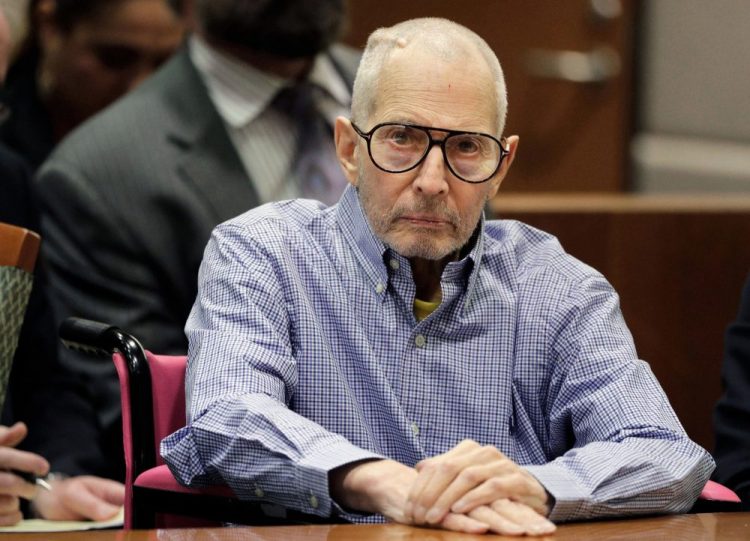LOS ANGELES — For someone who says he doesn’t like talking with people, Robert Durst has shown a propensity to open up to strangers. It has not done him any favors.
The New York real estate heir’s lengthy interviews with filmmakers led to a damning documentary on his suspected role in three killings. Before the final episode aired, he was arrested on charges of killing his best friend to silence her from telling authorities what she knew about the 1982 death of his wife.
While behind bars, Durst spent nearly three hours talking with the prosecutor who had been on his tail for two years. All of that led to a Los Angeles courtroom where jury selection began Wednesday for Durst’s trial on murder charges in the slaying of his friend.
“Can you stand up Bob?” defense lawyer Dick DeGuerin asked as he and co-counsel David Chesnoff, helped Durst to his feet from a jail wheelchair to greet prospective jurors. “And this is my client, Bob Durst.”
Durst was dressed in khakis and a plaid tweed blazer.
“If you’re going to be a juror, this is a fascinating case,” Superior Court Judge Mark Windham told prospective jurors. Theyhave been screened to make sure they can serve for up to five months.
“If you’re going to have one trial where you’re going to be a juror, this is the trial. These are the best lawyers I’ve ever seen. … This case is very, very interesting. … You’re never going to have an experience like this.”
Durst, 76, has pleaded not guilty to charges he shot Susan Berman in the back of the head in December 2000.
Prosecutors contend Durst silenced Berman to stop her from telling investigators what she knew about the 1982 disappearance of his wife, Kathleen, in New York. They plan to tell them Durst also killed a neighbor in Galveston, Texas, in 2001 while he eluded investigators in his wife’s death.
He was never charged in his wife’s presumed killing and was acquitted of killing and dismembering Morris Black in Texas, claiming he shot Black in self-defense.
Defense lawyers contend Durst did not kill Berman and doesn’t know who did.
With little physical evidence, prosecutors will be leaning heavily on Durst’s own words he allegedly said to friends and in recorded interviews he gave to the makers of the documentary “The Jinx: The Life and Deaths of Robert Durst,” as well as to Deputy District Attorney John Lewin.
The investigation in Berman’s death gained momentum after the documentary makers unearthed a letter Durst wrote to Berman years earlier. The envelope had nearly identical handwriting to a note sent anonymously to police directing them to Berman’s lifeless body.
The note mailed the day of the killing contained only the word “CADAVER” and Berman’s address. Both letters misspelled Beverly Hills as “BEVERLEY.”
Durst told filmmakers that only the killer could have written the so-called cadaver letter. When confronted with the letter he sent years earlier to Berman, he couldn’t distinguish between the two. Defense lawyers recently conceded Durst wrote the letter, though they have said it could have been sent by someone who didn’t kill Berman but knew there was a body in her house.
That claim is undermined by what Durst told Lewin in a New Orleans jail cell after his arrest in March 2015.
Durst told Lewin that “whoever wrote that note had to be involved in Susan’s death.”
“I know that when you killed Susan, that was not something you wanted to do,” Lewin said. “Do you know how I know that?”
“Umm, I’m gonna stay away from killing Susan,” Durst said.
“You know that the killer left a note. Right?” Lewin said. “I know that,” Durst said.
Durst, who told Lewin he didn’t like communicating with people, said he has not always told the truth. Defense lawyers have suggested their client has not always been reliable.
Durst told Lewin he was high on methamphetamine during the 20 hours of interviews he gave for “The Jinx,” though he said he stood by his answers.
Send questions/comments to the editors.



Success. Please wait for the page to reload. If the page does not reload within 5 seconds, please refresh the page.
Enter your email and password to access comments.
Hi, to comment on stories you must . This profile is in addition to your subscription and website login.
Already have a commenting profile? .
Invalid username/password.
Please check your email to confirm and complete your registration.
Only subscribers are eligible to post comments. Please subscribe or login first for digital access. Here’s why.
Use the form below to reset your password. When you've submitted your account email, we will send an email with a reset code.